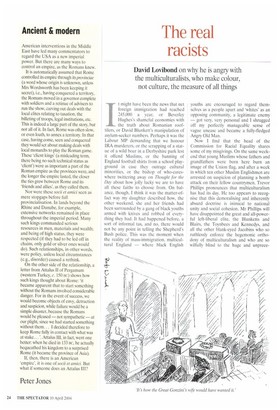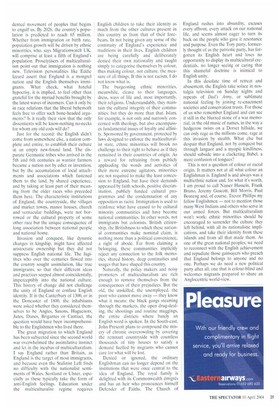The real racists
David Lovibond on why he is angry with the multiculturalists, who make colour, not culture, the measure of all things It might have been the news that net foreign immigration had reached 245,000 a year, or Beverley Hughes's shameful economies with the truth about Romanian rooftilers, or David Blunkett's manipulation of asylum-seeker numbers. Perhaps it was the Labour MP demanding that we honour IRA murderers, or the scrapping of a statue of a wild boar in a Derbyshire park lest it offend Muslims, or the banning of England football shirts from a school playground in case they outrage cultural minorities, or the bishop of who-careswhere twittering away on Thought for the Day about how jolly lucky we are to have all these faiths to choose from. On balance. though. I think it was the matter-offact way my daughter described how, the other weekend, she and her friends had been surrounded by a gang of black youths armed with knives and robbed of everything they had. It had happened before, a sort of informal tax, and no, there would not be any point in telling the Shepherd's Bush police. This was the moment when the reality of mass-immigration, multicultural England — where black English
youths are encouraged to regard themselves as a people apart and 'whites' as an opposing community, a legitimate enemy — got very, very personal and I shrugged off my perfectly manageable sense of vague unease and became a fully-fledged Angry Old Man.
Now I find that the head of the Commission for Racial Equality shares some of my misgivings. On the same weekend that young Muslims whose fathers and grandfathers were born here burn an image of the Union flag, and after a week in which ten other Muslim Englishmen are arrested on suspicion of planning a bomb attack on their fellow countrymen, Trevor Phillips pronounces that multiculturalism has had its day. He too appears to recognise that this demoralising and inherently absurd doctrine is inimical to national unity and social cohesion. Mr Phillips will have disappointed the great and all-powerful left-liberal elite, the Blunketts and Blairs, the Toynbees and Kennedys, and all the other blank-eyed Jacobins who so ruthlessly enforce the hegemonic orthodoxy of multiculturalism and who are so wilfully blind to the huge and unprece
dented movement of peoples that begins to engulf us. By 2026, the country's population is predicted to reach 65 million. Whether from immigration or birth rate, population growth will be driven by ethnic minorities, who. says Migrationwatch UK, will comprise at least a fifth of England's population. Proselytisers of multiculturalism point out that immigration is nothing new. Television personalities like Eddie Izzard assert that England is a mongrel nation and the English themselves immigrants. What cheek, what hateful hypocrisy, it is implied, to feel other than grateful for the myriad benefits brought by the latest waves of incomers. Can it only be in race relations that the liberal behemoth feels free to offer such bone-headed arguments? Is it really their view that the only dissentients will be know-nothing no-necks for whom any old cods will do?
Just for the record: the English didn't come from somewhere else, a nation complete and entire, to establish their culture in an empty new-found land. The disparate Germanic tribes who arrived in the 5th and 6th centuries as warrior farmers became a nation not by edict or invention, but by the accumulation of local attachments and associations which fastened them to the land, by shared experience, and by taking at least part of their meaning from the older races who preceded them here. The characteristic institutions of England, the countryside, the villages and market towns, manor houses, church and vernacular buildings, were not borrowed or the cultural property of some other race but the unique consequence of long association between national people and national home.
Invasion and conquest, like dynastic changes in kingship, might have affected aristocratic ownership but they did not suppress English national life. The fugitives who over the centuries flowed into the country sought assimilation, like true immigrants, so that their different ideas and practices seeped almost coincidentally, imperceptibly into the national culture. This history of change did not challenge the unity of England or confuse English identity. If in the Canterbury of 1300, or in the Doncaster of 1800, the inhabitants were asked whether they considered themselves to be Angles, Saxons, Huguenots, Jutes, Danes, Brigantes or Cantiaci, the question would have been incomprehensible to the Englishmen who lived there.
The great migration to which England has been subjected since the second world war overwhelmed the assimilative instinct and let in the incubus of multiculturalism.
I say England rather than Britain, as England is the target of most immigrants, and because even the Stalinist Left finds no difficulty with the nationalist sentiments of Wales, Scotland or Ulster, espe cially as these typically take the form of anti-English feelings. Education under the multiculturalist regime requires English children to take their identity as much from the other cultures present in this country as from that of their forebears. In not being given any sense of the continuity of England's experience and traditions in their lives, English children are being carefully and deliberately denied their own nationality and taught simply to categorise themselves by colour, thus making colour, not culture, the measure of all things. If this is not racism, I do not know what is.
The burgeoning ethnic minorities, meanwhile, cleave to their languages, dress, ways of life and, most importantly, their religions. Understandably, they maintain the cultural integrity of their communities; but they do more than that, Islam, for example, is not only and narrowly concerned with theology, hut also encompasses fundamental issues of loyalty and affinity. Sponsored by government, protected by laws designed to enforce the multiculturalist state, ethnic minorities will brook no challenge to their right to behave as if they remained in their countries of origin. As a reward for refraining from publicly applauding the words and activities of their more extreme agitators, minorities are not required to make the least concession to England, but have their demands appeased by faith schools, positive discrimination, publicly funded cultural programmes and the condemnation of any opposition as racist. Immigration is used to reinforce what have ceased to be cultural minority communities and have become national communities. In other words, not immigrants but colonists. British citizenship, the Britishness to which these national communities make nominal claim, is nothing more than a political convenience, a right of abode. Far from claiming a belonging, these communities implicitly reject any connection to the folk memories, shared history, deep continuities and usages that have shaped this country.
Naturally, the policy makers and noisy promoters of multiculturalism are rich enough to remove themselves from the consequences of their prejudices. But the old, the unskilled, the unemployed, the poor who cannot move away — they know what it means: the black gangs steaming through the markets, the open drug-dealing, the shootings and routine muggings, the entire districts where barely an English word is spoken. In the South-east, John Prescott plans to compound the misery of chronic overcrowding by covering the remnant countryside with countless thousands of tiny houses to satisfy a demand fuelled by migrants who cannot care for what will be lost.
Denied or ignored, the ordinary Englishman can no longer depend on the institutions that were once central to the idea of England. The royal family is delighted with its Commonwealth emigres and has an heir who pronounces himself Defender of Faiths, The Church of England rushes into absurdity, excuses every affront, every attack on our national life, and seems almost eager to turn its back on the people who gave it resonance and purpose. Even the Tory party, formerly thought of as the patriotic party, has forgotten its English heart and loses no opportunity to display its multicultural credentials, no longer seeing or caring that this shameful doctrine is inimical to English unity.
In this desolate time of retreat and abasement, the English take solace in nostalgia television on Sunday nights and repeats of Dad's Army, or sublimate national feeling by joining re-enactment societies and conservation trusts. For those of us who remember England and can see it still in the blurred stone of a war memorial, in the old music of names, in the way a hedgerow twists on a Dorset hillside, we can only rage as the millions come, rage at this invasion by stealth. What else but despair that England, not by conquest but through languor and a myopic kindliness, should subside into a clacketing Babel, a mere confusion of tongues?
This is not a question of colour or racial origin. It matters not at all what colour an Englishman is. England is and always was a multiethnic nation and, for what it's worth, I am proud to call Nasser Hussein, Frank Bruno, Jeremy Guscott, Bill Morris, Paul Boateng and, of course, Trevor Phillips my fellow Englishmen — not to mention those many West Indians and others who serve in our armed forces. But multiculturalism won't work; ethnic minorities should be encouraged to surrender the culture they left behind, with all its nationalistic implications, and take their identity from these islands and from all that made them. As one of the great national peoples, we need to reconnect with the English achievement and repudiate those gainsayers who preach that England belongs to anyone and no one. Perhaps we do need a new political party after all, one that is colour-blind and welcomes migrants prepared to share an Anglocentric world-view.



































































 Previous page
Previous page